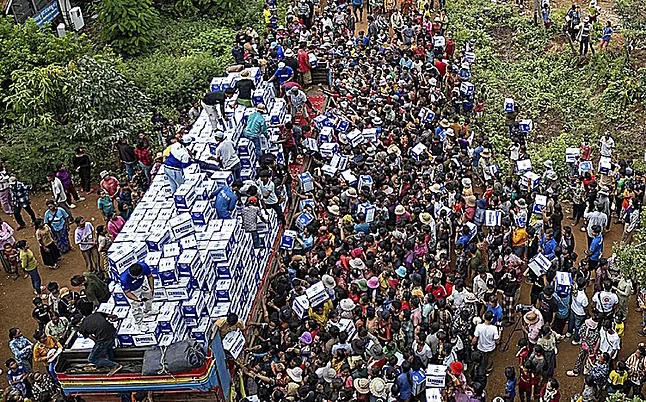Searches have surged online about whether it is safe to travel to Thailand this summer, one of the most popular tourist destinations during this time. Travel agencies are also receiving many calls from confused clients unsure whether to cancel their scheduled vacations on the beaches of the Buddhist kingdom. We are talking about a country that last year welcomed over 35 and a half million international visitors, of which 208,000 were Spanish.
In Cambodia, another Southeast Asian nation heavily reliant on tourism, a similar situation is unfolding. There have been cancellations, especially from travelers from nearby countries like China eager to visit the fascinating temple complex of Angkor Wat, originally dedicated to the Hindu god Vishnu in the 12th century.
As August approaches, the echoes of war have reverberated in Thailand and Cambodia. At least a significant military clash because, since Thursday, their armies have been fighting along their over 800-kilometer border. This Sunday, Thailand and Cambodia faced off for the fourth consecutive day.
The confrontation has already left 33 dead, hundreds injured, and over 200,000 displaced. A drama that, judging by search trends especially on Western servers, has attracted enormous attention because there are tourists concerned that a conflict might ruin their vacations.
The fighting continued on Saturday and Sunday at various points after Thailand declared martial law in eight border districts with Cambodia. It also ordered the closure of six national parks. The now critical regions on both sides (between northern Cambodia and eastern Thailand) are far from the usual tourist attractions in both countries. There are prominent temples in the mountainous border areas, but they hardly receive visits from foreigners, not even backpackers seeking to explore more remote and less crowded sites.
For example, the surroundings of the Hindu temple of Preah Vihear, which has been a focal point of clashes, is located 450 kilometers from Bangkok and 305 kilometers from Phnom Penh. Some nations, such as Australia, United States, or South Korea, have only advised their citizens not to travel to border areas. Tourism contributes to 12% and 9% of the GDP of Thailand and Cambodia, respectively.
The positive note in the last hours is that a possible de-escalation is on the horizon. Both parties have communicated their willingness to sit down and negotiate a ceasefire. "We have agreed to start a bilateral dialogue," said the Thai Ministry of Foreign Affairs.
This statement followed a series of posts by U.S. President Donald Trump, stating that the leaders of Cambodia and Thailand had agreed to meet immediately to negotiate peace.
Thailand's interim Prime Minister, Phumtham Wechayachai, thanked Trump for his intervention in this crisis and said his country "agrees in principle to a ceasefire." In the early hours of Sunday, Cambodian leader Hun Mane also expressed his gratitude to Trump and stated that his government agreed with the proposal.
Despite this rapprochement, new artillery clashes erupted on Sunday morning near two long-disputed ancient temples in one of the border areas. A Cambodian spokesperson said that Thai forces began attacking at 4:50 in the morning. Meanwhile, Bangkok pointed out that it was the Cambodian army that first opened fire that day as both sides fight for control of strategic positions.
On Saturday, the news was the advancement of fighting in more border provinces. Thai authorities reported that the Navy joined ground troops to repel a Cambodian troop incursion at three different points in Trat province. In the neighboring region of Pursat, several reports indicate that Thai forces fired heavy artillery shells at residential areas.
Both sides have exchanged accusations of war crimes. Phnom Penh claims that the Thai army dropped cluster bombs, prohibited by the UN, on seven border areas within Cambodian territory. Yesterday, images of Thai and Cambodian civilians seeking safe shelters while the fighting continued circulated on social media. Some hid in makeshift underground bunkers, while others sought refuge in schools, gyms, and even in Buddhist temple pagodas.
The conflict, fueled by a long-standing border dispute dating back to the border division drawn during the French colonial period in Cambodia, erupted on Thursday in a direct clash involving combat aircraft, artillery, tanks, and ground troops. According to the latest official updates on casualties, 14 civilians and six military personnel would have died on Thai territory, while eight civilians and five soldiers died on the Cambodian side.
"Thai armed forces have used heavy weaponry, including bombing civilian targets. This is a brutal territorial ambition that blatantly violates international law. Cambodia is a victim of aggression by the Thai army, whose intention is to fulfill an expansionist ambition to seize Cambodian territory," denounced Pen Boda, a spokesperson for the Cambodian government. Thailand also accuses the other party of initiating the conflict and attacking civilian areas.
Amid fears of a wider war breaking out, diplomacy has intensified in the last hours. In addition to Trump's intervention from Scotland, Southeast Asian neighbors have been the most active in mediating, especially Malaysia, with Prime Minister Anwar Ibrahim exchanging calls with both governments.
China, the regional superpower, has also offered to mediate. Although Beijing has gone further, delving into the roots of this conflict. "The fundamental cause of this problem lies in the persistent consequences left by Western colonialists in the past, and now it is necessary to face it calmly and handle it properly," said Wang Yi, Chinese Foreign Minister, who stated that his country is ready to maintain a fair and impartial position to help end the fighting.
